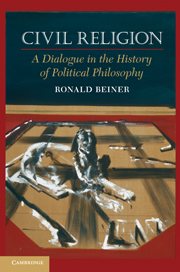Book contents
- Frontmatter
- Contents
- Preface and Acknowledgments
- Introduction
- Part I Machiavelli, Hobbes, Rousseau
- Part II Responses to (and Partial Incorporations of) Civil Religion within the Liberal Tradition
- Part III Theocratic Responses to Liberalism
- 25 Joseph de Maistre
- 26 Maistrean Politics
- 27 Maistre and Rousseau
- 28 Carl Schmitt's “Theocratic” Critique of Hobbes
- Part IV Postmodern “Theism”
- Conclusion
- Index
- References
25 - Joseph de Maistre
The Theocratic Paradigm
Published online by Cambridge University Press: 05 June 2012
- Frontmatter
- Contents
- Preface and Acknowledgments
- Introduction
- Part I Machiavelli, Hobbes, Rousseau
- Part II Responses to (and Partial Incorporations of) Civil Religion within the Liberal Tradition
- Part III Theocratic Responses to Liberalism
- 25 Joseph de Maistre
- 26 Maistrean Politics
- 27 Maistre and Rousseau
- 28 Carl Schmitt's “Theocratic” Critique of Hobbes
- Part IV Postmodern “Theism”
- Conclusion
- Index
- References
Summary
[Man] grovels painfully like a reptile whose back has been broken.
– Joseph de MaistreWe shall keep our priests within the confines of their temples in the same way as we shall keep our professional army within the confines of their barracks.
– Theodor HerzlTrue theocracy is not a civil religion. In the light of Hobbes, one could even say that theocracy is the opposite of civil religion, for civil religion seeks to instrumentalize religion on behalf of political purposes, whereas true theocracy subordinates politics to religious ends. Civil religion must therefore oppose itself to secularist regimes on the one side and to theocratic regimes on the other side; and in this sense civil religion represents, in relation to the spectrum of religious–political possibilities, a kind of unstable middle position between real theocracy at one pole of the spectrum and secular liberalism at the opposite pole.
Why study Joseph de Maistre today? Maistre is such a renegade figure within the history of political thought that one feels compelled to ask this question. One answer is that if we are really going to measure up to the challenges of contemporary theocracy, we probably need to start doing a better job of thinking outside liberal horizons. There is certainly no question that when we enter Maistre's intellectual world, we have left the liberal universe far behind. As we see theocracies or potential theocracies springing up in various parts of the world, the realization dawns that we need to start thinking this through philosophically. Liberal philosophers like Rawls do not permit sufficient penetration into the illiberal mind (none at all, really) to be of any help here. The parallel with nationalism suggests itself: Both in the case of nationalism and in the case of theocracy, liberals cherished pious hopes that these political phenomena would fade away and become politically irrelevant, that they were capable of being privatized or defanged. If we are to be properly equipped to face these challenges, we need (at least as an exercise in the enlargement of political imagination) to try to enter an intellectual horizon from within which liberalism's expulsion of religion from the public domain looks like madness – not sane and rational, as it necessarily appears to any liberal, but, as it were, a violation of nature's dictate.
- Type
- Chapter
- Information
- Civil ReligionA Dialogue in the History of Political Philosophy, pp. 309 - 342Publisher: Cambridge University PressPrint publication year: 2010

